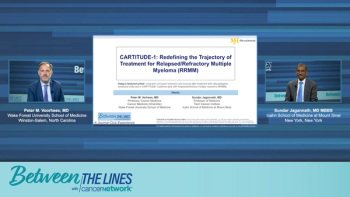
Panelists discuss how advancements in treatment options, including chimeric antigen receptor (CAR) T-cell therapy, bispecific antibodies, and antibody-drug conjugates, are shaping the current multiple myeloma landscape.

Your AI-Trained Oncology Knowledge Connection!


Panelists discuss how advancements in treatment options, including chimeric antigen receptor (CAR) T-cell therapy, bispecific antibodies, and antibody-drug conjugates, are shaping the current multiple myeloma landscape.

Panelists discuss how the evolution of FDA approvals for multiple myeloma therapies reflects rapid innovation and increasing effectiveness, particularly with cell-based treatments.

Panelists discuss how the baseline characteristics of CARTITUDE-1 participants underscore the trial’s focus on patients with heavily pretreated and refractory disease.

Panelists discuss how the CARTITUDE-1 trial was designed to evaluate cell therapy in relapsed/refractory multiple myeloma and the importance of long-term follow-up in understanding efficacy and safety.

Panelists discuss how CARTITUDE-1 addressed an unmet need by targeting late-line, refractory myeloma patients with a fixed dose of chimeric antigen receptor (CAR) T-cell therapy for potential accelerated approval.

Panelists discuss how the efficacy outcomes from CARTITUDE-1, including a substantial progression-free survival (PFS) benefit, highlight the transformative impact of deep, sustained minimal residual disease (MRD)-negative responses.

Panelists discuss how safety outcomes from CARTITUDE-1 revealed that most adverse effects, including cytokine release syndrome (CRS) and neurotoxicity, were manageable and reversible, even in advanced-stage patients.

Panelists discuss how the 5-year data from CARTITUDE-1 demonstrate that a substantial subset of patients achieved long-term remission, suggesting a potential shift toward curative therapy.

Panelists discuss how some patients in CARTITUDE-1 maintained stringent complete remission for more than 5 years without further treatment, potentially redefining the concept of cure in myeloma.

Panelists discuss how extended follow-up from CARTITUDE-1 shows continued overall survival benefit with minimal new safety concerns, reinforcing the durability and safety of cell therapy.

Panelists discuss how the durability of response and long-term minimal residual disease (MRD) negativity in a subset of patients supports redefining treatment end points and cure in multiple myeloma.

Panelists discuss how long-term CARTITUDE-1 data may change clinical practice by validating earlier use of ciltacabtagene autoleucel (cilta-cel) and informing personalized treatment strategies based on risk and disease biology.